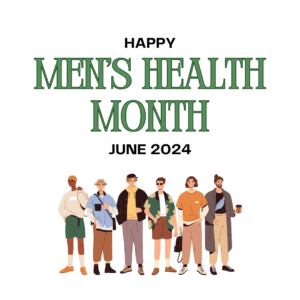When it comes to men’s health there can often be a lot of misconceptions and stereotypes, causing misinformation about men’s health to spread. Taking a look at your own health it is important to understand the truth instead of making general assumptions. This Men’s Health Month you can learn more about men’s health by focusing on the facts rather than the common assumptions and stereotypes. Here is a list of five common misconceptions about men’s health compared to the factual information.
Misconception #1: Men are not at risk of getting breast cancer.
Fact: A lot of people think that it is impossible for men to get breast cancer. While it is uncommon, it is not impossible. There are a number of risk factors that increase a man’s change of getting breast cancer. Some of these risk factors include family history, obesity, genetic conditions, and age.
Misconception #2: Men are naturally stronger and healthier than women.
Fact: It is commonly believed that men are stronger and healthier than women. While men may have certain physiological advantages in strength and muscle mass, this does not mean that they are healthier. Men are not immune to health issues such as heart disease, cancer, or diabetes.
Misconception #3: Only older men need to worry about prostate cancer.
Fact: Prostate issues, including cancer, can affect men of all ages. Men are commonly diagnosed with prostate cancer in their 60s however younger men can still be affected. It is better to be aware early on as early detection and treatment can help to improve outcomes.
Misconception #4: Men do not experience mental health issues.
Fact: Mental health disorders affect both men and women. There is a stigma that men need to be tough and should not show their emotions. This stigma can prevent men from seeking help for depression, anxiety, or any other mental health disorders they may be dealing with.
Misconception #5: Men do not need to worry about osteoporosis.
Fact: Osteoporosis is often seen as a women’s health issue. While it is more common for women to have osteoporosis than men, it still happens. Men might develop weak bones as they age, especially if they have low testosterone levels or other risk factors.
By dispelling myths and encouraging open conversations, men feel more empowered to focus on their well-being and seek medical advice in a timely manner. Let’s continue to challenge stereotypes by focusing on the facts. Empowering men to take control of their health should be important not just Men’s Health Month but everyday.



